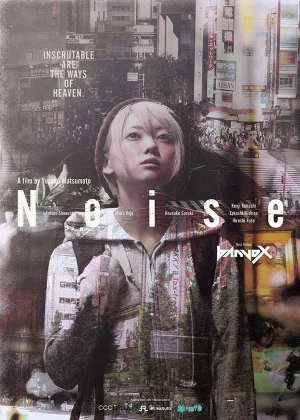Noise

Yusaku Matsumoto's Noise is one of those films that slipped through the cracks. It came with very solid praise when it was originally released, but for whatever reason, it failed to make it past the festival circuit and quickly faded into obscurity after that. Of course, Japan produces tons of films each year and not all have the chops to make it on the international stage, but it's still a little baffling to think a quality production like this can't be guaranteed proper distribution. Luckily, dedicated fandom often goes where official distribution lines daren't.

If Noise has one thing working against itself, it's that writer/director Matsumoto is young. His film has some strong contemporary elements that can definitely make it harder to be accepted by both local and international cinephilia. It's a bit of a negative spiral that has proven difficult to escape from (just ask Ken Ninomiya), but it's good to see some people won't give up trying. Personally, I love the youthful energy that Matsumoto brings to Noise, it's essential to set the film apart from a million other Japanese dramas, which play it safer and are far more afraid to take any risks.
The film is situated in Akihabara, Tokyo's nerdy/techy district. Matsumoto doesn't chase any of the usual otaku-type phenomena though. Instead, he digs into the seedier parts of the district and draws drama from traditional traumas. It's just the characters that are a little different from the norm. No "perfect Japanese school kids" or model citizens here, but more lived-in people who showcase a stronger personal identity (and more personal defects). It's small details like these that make a considerable impact, certainly in a niche that is quite strict and well-defined.
The film centers around a brutal and random killing that occurred in the center of Akihabara. The true motive of the perpetrator was never discovered, but the aftermath of his actions are permanent scars on the city and those whose lives were affected. A young girl saw her family torn to shreds when her mother was killed in the incident, another young girl left home to try and find happiness in Akihabara, and a young boy works as a delivery guy to support himself and his irresponsible mother. All three are struggling to keep their heads above water.

The cinematography has a slightly more modern feel to it. It's not overly explicit and the film still broadly conforms to reigning genre expectations, but even little improvements like this deserve to be celebrated. The camera work is a tad more dynamic, there are some tightly edited scenes scattered throughout and the overexposed visuals give the film an eerie/ethereal glow that fits the Akihabara setting. Matsumoto could've taken things further and I certainly wouldn't have minded, but the film looks nice and it's definitely a step up from similar Japanese dramas.
The soundtrack on the other hand takes a bolder approach, which is something I truly appreciate. It was obvious from the moment composer Banvox was credited (sporting his own logo/branding) that Matsumoto wasn't settling for a traditional drama score. The electronic-based music felt relevant and refreshing, something these young kids would actually listen to. It's not something I'd particularly enjoy outside the context of the film, but that is of secondary importance. Matsumoto made a very smart choice by not skimping on the soundtrack, and Noise is all the better for it.
The performances are also commendable. Urara Anjo is a real discovery, and it's more than a little disheartening to see she hasn't acted in anything since. The same goes for Kokoro Shinozaki, only Kosuke Suzuki found a few more minor gigs, though nothing of note. As first-time actors, they did a tremendous job, which is also a testament to Matsumoto's people skills. The secondary cast is made up of slightly more seasoned actors, though no familiar names. Noise proves (once again) that you don't need famous and/or seasoned actors to make a successful drama.

While there is a meager narrative, Noise is a film that puts its primary focus on three characters (with Akihabara being the invisible fourth) and the various ways they try to deal with the trauma life throws at them. If you want sturdy plot progression or a comfortable conclusion, you probably won't find it here. The film does build up to an inevitable finale, which it then teasingly cuts from the film, as the implications of the final shot are crystal clear. I'm sure this won't be to everyone's liking, personally, I felt it just made the finale more powerful and poignant.
Noise is a true calling card. It proves Matsumoto has a place in the Japanese drama scene, where he can deliver something most other directors simply cannot. It's good to see then that he finally managed to release his second feature film last year. As for Noise, expect a somewhat gritty but heartfelt and compassionate look at an underexposed part of Japanese youth culture, appropriately stylized and building up to a memorable finale. Getting to the film will be problematic, as international distribution has failed Matsumoto so far, but if you're given the chance and you have a penchant for this type of film, don't miss the opportunity.